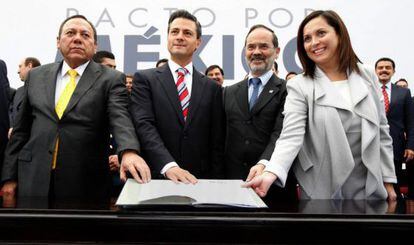Mexican parties pact for the future
Peña Nieto gets major commitments from opposition a day after taking office

Just one day after he was sworn in as Mexico's new president, Enrique Peña Nieto on Sunday signed a pact with the country's top two opposition parties to push a series of major reforms through Congress, including a profound overhaul of the country's educational system.
Known as the Pact for Mexico, the agreement hammered out by Peña Nieto's ruling Institutional Revolutionary Party (PRI) with lawmakers from the other parties aims at propelling the country's economy by focusing on creating job opportunities, increasing competiveness and eradicating inequality.
Peña Nieto, 46, took his oath Saturday, marking a return to office for the historic PRI after 12 years on the sidelines. He promised to restore peace and security to a nation wracked by a bloody drug war that has claimed more than 50,000 lives in the past six years.
Almost a Mexican version of Spain's Moncloa Pact, which was signed by Spanish political parties during the Transition, the agreement is a policy pledge for Peña Nieto's six-year term, in which the president has also promised to open the state-run Pemex oil giant to foreign investment and issue more licenses in the telecommunications sector.
Plurality and different visions are needed, not obstacles to growth"
The pact was signed less than 24 hours after the new president was sworn in, with representatives of the National Action Party (PAN) and Democratic Revolutionary Party (PRD).
Since the last PRI president was in office - Ernesto Zedillo, from 1994 to 2000 - Mexico's bickering parties have tried unsuccessfully to come up with such broad political consensus.
"It is time for us to meet and it is time for the agreement," Peña Nieto said during the signing ceremony. "Plurality and different visions are what is needed, rather than obstacles that block Mexico's growth and our plans for the nation in the 21st century."
Outgoing President Felipe Calderón and his PAN, which kicked the PRI out of office in 2000 after it had ruled the country for nearly 70 years, had pledged to reinvigorate Mexico, but he was bogged down by an ongoing bloody drug war with the powerful cartels that control profitable cocaine and marijuana routes in the northern states bordering the US.
PAN party president Gustavo Madero recognized that Mexico's "weak institutions have affected the people who most need help," while at same time "benefitting fanatical powers."
He noted that Mexico is the 13th-largest economy in the world but, however, ranks number 57 in the United Nation's human development index and number 51 in the International Competitiveness Index.
The pact includes developing a mandatory social security system so that Mexicans will get a pension at the age of 65. The parties have also pledged to reform Mexico's tax code and seek to suppress the country's notorious underground economy.
Saturday's inaugural ceremonies in Mexico City were marred by pockets of violence.
The PRD fought a difficult presidential race to prevent the PRI from regaining power. Throughout the campaign Peña Nieto insisted to young voters that the PRI was different from the parties their parents had voted for in the past. The PRI was notorious for its cronyism and ruled Mexico for decades as a one-party dictatorship, although by Zedillo's term it had introduced democratic reforms.
Riot police blocked off a perimeter outside the national palace, where protestors threw rocks and bottles at security officers. Restaurants and shops in the historic center were looted and the famous monument to Mexican patriot Benito Juárez was vandalized.










































